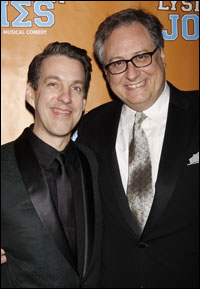
*
Quick: Who wrote Godspell? Porgy and Bess? Mamma Mia!?
If your answers are "Stephen Schwartz," "the Gershwins" and "those guys from ABBA with the extra letters in their names," you're two-thirds correct. Because in addition to the composer and the lyricist, there's the misunderstood middle child of musical theatre, the clunkily-monikered "book writer" or "librettist."
The job description itself is bound to confuse, particularly in the case of Pulitzer Prize–winning playwright Marsha Norman, who adapted the novels The Secret Garden and The Color Purple into musicals. "Whenever I say I wrote the book," Norman says, "they think that I'm claiming I'm Frances Hodgson Burnett or Alice Walker. So I say I wrote the musical book."
Tony Award–winning playwright and actor Harvey Fierstein tried (and discarded) the titles "librettist" and "author" when he wrote the musicals La Cage aux Folles, A Catered Affair and Disney's upcoming Newsies. "Nobody really knows what the book is," he says. "If the show's a hit, the composer gets the credit; if the show's a flop, it's the book's fault." "You're going to get all of the blame and none of the praise," echoes Norman. "But you'll still get a third of the money."
So what do book writers do, exactly?
While theatregoers understand that a playwright creates the entire story of a play, many think that book writers just write the dialogue between the songs. But more often, the book writer first decides where the songs go and what they will be about, acting as the structural engineer of the whole piece.
"Think of a musical as a string of pearls," says Norman. "If you don't have a string, you can't put the pearls around your neck."
Fierstein puts it another way: "A musical has all these moving parts, but the book is the chassis," providing both the framework and the running gear for the show to operate.
So with Newsies, it was Fierstein who took the character of Denton, a male reporter in the film, and gave him a sex change to become Catherine, the love interest.
However, once a composer and lyricist create the songs, the book writer's role changes. "At first, the book writer dictates what happens," Fierstein says, "but then you become subservient. The music is the hardest to change, so you have to adapt the scenes to the songs."
Even a theatre legend like Stephen Sondheim finds the task of book writing daunting. "I've often been asked why don't I write my own librettos, because often the songs seem to be libretto-like songs," he said in the Roundabout Theatre Company docu-revue Sondheim on Sondheim. "I think playwriting is too difficult and I don't ever think I could write a play."
Unlike a play, though, "the book shouldn't stand out and wave at you," says Fierstein.
| |
 |
|
| Lysistrata Jones songwriter Lewis Flinn and librettist Douglas Carter Beane. | ||
| photo by Joseph Marzullo/WENN |
The exception to that rule seems to be musicals that deliver big laughs, like Beane's books for Xanadu, Sister Act and this season's Lysistrata Jones. Beane is influenced by the frothy books of vintage comedy writers like George S. Kaufman and Comden & Green, saying, "I go back to them the way evangelicals go back to Leviticus."
Yet he, too, feels the need to serve the songs: "Writing the book is so tight, it's like writing haiku." When Beane rewrote Sister Act, director Jerry Zaks was so determined to get to the music faster he asked Beane to change the words "do not" in the dialogue to "don't."
And no matter how funny the jokes are, no one walks out of a theatre humming the dialogue. Likewise, you won't find anyone at the intermission of Wicked, having just heard Elphaba wail "Defying Gravity," say, "That Winnie Holzman did a great job deciding to end the act there!"
That's because book writers craft the story around key emotional/musical moments. "When you can no longer talk about it, you have to sing," says Marsha Norman. "It's the moment in conversation when you say 'but….' The songs represent the inside of your brain: the things you think are the songs, the things you say are the book." "Musicals amplify emotions," says Fierstein. When Fierstein wrote La Cage aux Folles, legendary book writer Arthur Laurents (West Side Story, Gypsy) taught him his number one rule of musicalizing a story: "Does it sing?"
Similarly, Norman teaches her playwriting students at Juilliard that audiences respond to musicals emotionally rather than intellectually. "People listen to music with cavemen ears: Is it a bird song or the call of a lion?" Norman says. "The audience at a musical is dancing in their hearts."
So when your heart dances to the music of Godspell, Porgy and Bess and Mamma Mia!, try to remember that it was the book writers John-Michael Tebelak, DuBose Heyward (and Suzan-Lori Parks for the recent Broadway revival) and Catherine Johnson who pulled you onto the dance floor.










